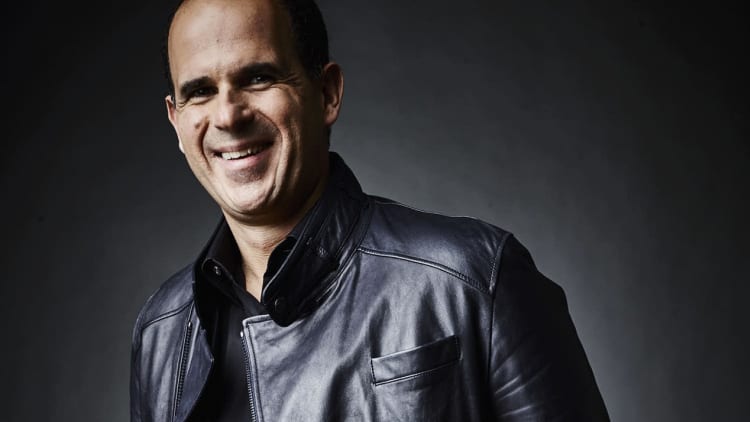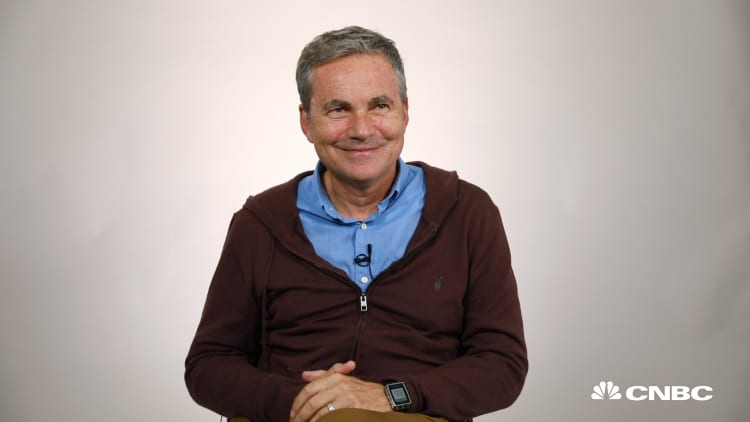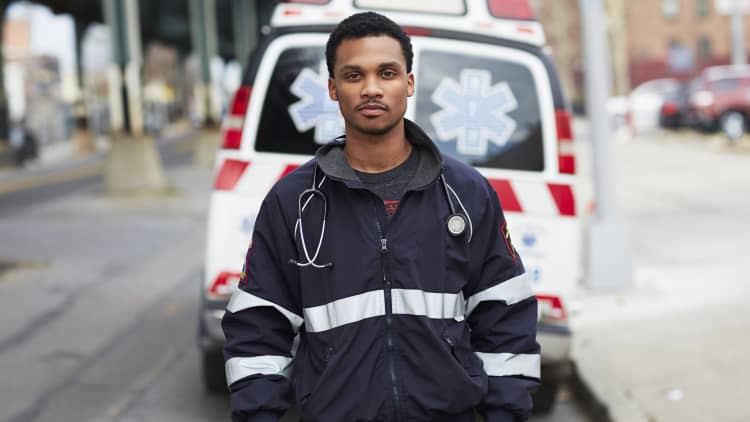ParaDocs, Alex Pollak's medical staffing company, goes where the people are. This year, that meant the now notorious Fyre Festival in the Bahamas, which turned out to be a fiasco. The paramedic and business owner had agreed to attend to provide health-care services with his staff but, fortunately, Pollak had second thoughts and pulled out because he "thought it was a sham."
As things turned out, Pollak tells CNBC, "I'm glad I trusted my gut."
Trusting his gut has generally worked out well for Pollak, one of the few MBAs who is also a licensed and practicing EMT. Though he started out in 2006 at a hedge fund with "a high-paying job doing very little," he lost interest in finance and "felt good" about the shift to working in medicine full-time.
Since starting his business in 2011, ParaDocs has grown precipitously. It now operates at races, wrestling matches, music festivals and even corporate events, and it just secured a contract to provide all medical care for events at New York's Nassau Coliseum. So Pollak has no regrets about leaving the hedge fund. "I do not miss finance at all," he says. "There's a lot of finance in what I do now."
There's a lot of helping too. ParaDocs employees "save lives," he says. "Definitely."
Part of what makes his services so appealing and accessible is that it's available to patients at no cost, regardless of whether or not they have insurance.
"We set up a mini-hospital, pretty much, on site" at an event, says Pollak. The service brings in doctors, nurses, EMTs and paramedics who offer free health care, "and people know it's free, at the festivals," he says. "They kind of paid for it through their tickets."
Though laws differ depending on locale, "mass gatherings" are often obligated to provide some kind of infrastructure for helping with medical emergencies, all of it paid for by organizers. Whether it's "one patient or 1,000," Pollak says, the care is "all-inclusive" and "no one gets a bill besides the promoter."
That means that attendees "seek us out early on, because they know it's free and we're friendly and approachable, and that's great, because if they come to us early enough, [a potential condition] doesn't escalate," says Pollak. "We don't have to spend a ton of resources and time and money fixing them up."
In other words, patients can save a lot of trouble by seeking preventative care and treating a problem in its early stages, before it becomes a far costlier and more dangerous emergency. If only every American were able to do the same.
Pollak has been working as a paramedic for 20 years now; he even served as a first responder in New York City after seeing the second plane hit the Towers on September 11, 2001. He has experienced firsthand the limitations of the American health care system and its effect on people. Nowadays taking emergency calls can leave him feeling burnt out and frustrated.
But there are times he still enjoys the work: "Coming into a call where you're saving someone's life or delivering a baby, really helping someone out, it's very gratifying," says Pollak. But nine times out of 10, 911 callers need a doctor, not emergency care.
There are some commonalities among the two very different populations he treats. Pollak spends a disproportionate amount of time helping both festival-goers and New York City residents with drug overdoses. The only difference, he says, is which drugs people choose.
Event attendees, who are usually affluent and healthy, prefer psychedelics, which leave them "agitated" and seeking help from one of Pollak's red-shirted staff members at the medical tents. "Young people don't know how to regulate," he says, a problem he attributes to today's YOLO, "no moderation" culture.
Pollak himself cannot entirely relate: "I had never been to a music festival before I started working at one."
Although he brings Narcan to festivals, staff has hardly ever had to use it. It's poorer city-dwellers, in his experience, who opt for opiates.
Lesser maladies that plague festival-goers include dehydration — though sometimes more exotic accidents befall them too, especially at events held in nature: "A cute little pig could charge you and bite you," Pollak says. If that happens, you don't need to be transported to an overwhelmed local hospital. Instead, a red shirt can take care of you on-site.
The red shirts have helped to relieve the stress on local emergency rooms that otherwise would be overwhelmed with demand every time an area hosted a major event, such as the weekend-long Okeechobee Music and Arts Festival that brings 30,000 out-of-towners into Okeechobee, Fla., in early March.
The ParaDocs medical tent "handled more cases in three days than they do in a month," he says, and transported only 10 attendees for "major trauma." Everyone else they were able to patch up then and there.

Delivering health care in a way that works and makes sense feels very gratifying to Pollak. And building a seven-figure business has been gratifying too. ParaDocs brought in $2 million in revenue last year, he reports, and is on track to do $3-4 million this year. He also runs a non-profit, ParaDocs Ambassadors, that relies on medical students.
Both endeavors continue to expand. His dream is to have "a red shirt in every stadium out there."
When asked if he considers himself a self-made millionaire, Pollak laughs and says he doesn't know: "I have a million dollars in a bank account but I have to cover payroll. I have to pay my people. I give every penny to pay my employees. It's like family." Six of his employees are on staff full-time, and an army of 1,600 others, including 100 emergency room doctors, join up for contract work.
He recalls that, when he started the business and bought his first defibrillator, he had to pick up three EMT shifts to cover the costs. "Now I finance myself," he says. He may not feel comfortable calling himself a millionaire quite yet, but he's confident in his endeavor and in himself. "Eventually," he says, "I'll make it."




